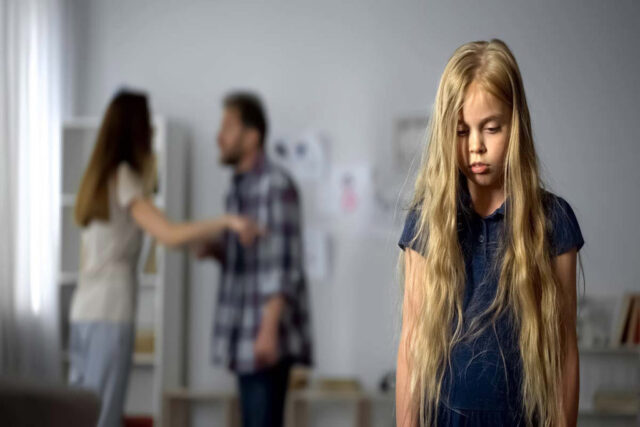All those who were a part of dysfunctional families in their childhood grow up to learn some of the toxic behaviors of their parents or guardians and manifest them in their future relationships.

A child always looks up to his parents for guidance and counsel, and if he is brought up in an unhealthy environment, he will definitely grow up as an unhealthy individual himself. Being sexually abused or bullied by friends in childhood can also have serious negative impacts on an individual’s mind.
A person who walks around with traumatic childhood memories instead of good ones, is more likely to unburden them on someone else, most probably, his or her partner.
Importance Of Good Parenting
One’s past is often reflected in his future. If a person has had a troubled past, it will definitely affect them in the future. Parents, who are role models for their children, must create a happy and wholesome environment for their kids to grow up in.
They should set a good example in front of their children by maintaining a healthy relationship with each other and with everyone in the family.

How our parents communicate with us, or how our parents communicate with each other, has a deep and lasting impact on our minds. It helps us get a picture of how we are supposed to interact with the people around us.
If our parents are always cursing, abusing, and fighting with each other, we learn to do the same with our partners when we grow up. Abusive and neglectful parents become so self-absorbed that they seldom realize how their behavior is affecting their children’s mental health.
It is a great struggle for a child with a traumatic past to maintain healthy relationships of his own in the future.
Our Choice Of Partner Is Related To Our Childhood Trauma
Psychologist Nicole LePera said, “Who we seek as partners are subconscious manifestations of our childhood relationships with a parent. The subconscious mind is always looking for familiar patterns to repeat in an attempt to repair.”
Very often, those with a traumatic childhood tend to look for the care and affection in their adult relationships that they lacked in their abusive parental relationships. And as a result, they go looking for love in all the wrong places and end up in toxic relationships that become a reflection of their childhood.

Individuals who grew up in dysfunctional families are subconsciously drawn toward toxicity. In a way, one’s choice of partner is related to their traumatic childhood experiences.
Dominating partners, cheaters, physically abusive partners, emotionally unavailable partners, and partners who are very critical are some of the types of partners that we most commonly choose when our childhood trauma overshadows our adult relationships.
Also Read: Minister Says Live-In Relationships Is Crime, Holds “Educated Girls” Guilty
8 Ways Childhood Trauma Can Affect Adult Relationships

A person with bad childhood memories will find it difficult to adjust in his future relationships. Here are 8 ways in which one’s childhood trauma can show up in his or her adult relationships.
- Commitment issues are one of the most dangerous trauma responses that can come in the way of your relationships. Someone with a disturbing childhood will feel everybody else is going to hurt them in the same way their caregivers did. As a result, he or she finds it very difficult to commit to someone.
- Abandonment issues can take a huge toll on the traumatized individual’s mental health. Individuals who were abandoned or neglected by their parents in childhood may become overly dependent on their partners in the future. They become clingy, and their constant fear of abandonment creates pressure on their partners.
- Childhood trauma also manifests itself through fear, over-possessiveness, insecurities, and jealousy.
- Individuals with childhood trauma, either quarrel and argue with their partners all the time or keep away from fights at all costs.
- Staying in long-term toxic relationships is another trait exhibited by someone with a traumatic childhood. The urge to “fix” your partner comes from a place of void in one’s childhood. He or she feels that being with someone who is unfit for them is better than being alone.
- Individuals who grow up in a chaotic environment are more likely to slip into depression or have an anxiety disorder, panic attacks, bipolar disorder, or other mental health problems. These can affect one’s adult relationships in the future.
- Sometimes we do not know how to sort things out after a fight with our partners. Being unable to make a compromise, giving silent treatment, or pretending as if nothing happened are some of the toxic ways one can react after a conflict with his partner, and they arise from childhood trauma.
- Brought up in a toxic environment, one can often fail to control his anger and thus throw his childhood trauma in the face of his partner by being abusive in the same ways his caregivers were. Anger management becomes difficult for those with a toxic, abusive past.
A happy childhood is one where you grow up with love from your parents, family members, and friends.
Let us know your opinion in the comment section below.
Disclaimer: This article is fact-checked
Image Credits: Google Photos
Feature Image designed by Saudamini Seth
Source: Hindustan Times, The Times Of India & Blogger’s own opinion
Find The Blogger: @ekparna_p
This post is tagged under: childhood, youth, childhood trauma, abusive parents, toxic relationships, relationships, dating, depression, anxiety, abandonment issues, attachment issues, commitment issues, bad parenting, toxicity, trauma, abuse
Disclaimer: We do not hold any right, copyright over any of the images used, these have been taken from Google. In case of credits or removal, the owner may kindly mail us.
Other Recommendations:
In Pics: Fandom Merchandise Like Beyblades From Our Childhood Days As A 90s Kid
































